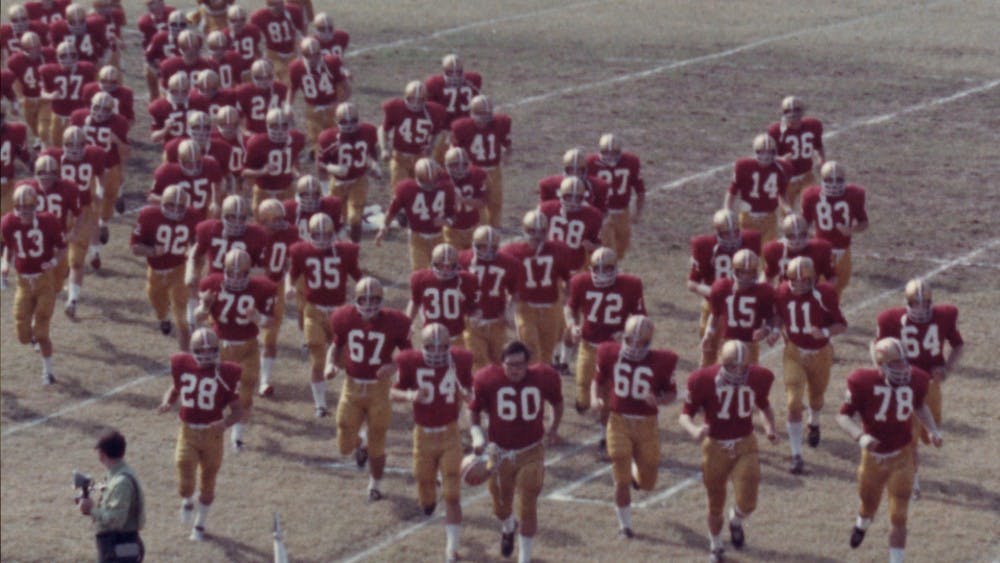It is hard to encompass 125 years in Elon's athletic history, from the multitude of conference titles, the controversial mascot change and the iconic athletes who left their respective legacies.
It all began in 1900. Elon's first intercollegiate athletics event was a series of two baseball games against Guilford College and over the next 20 years, Elon began to establish itself as an elite collegiate athletic program.
In 1922, Elon adopted a new nickname: the Fightin' Christian, a name that first described the spirit of the Elon athletes.
"I think a sports writer said something to the effect that the Christians were fighting the Quakers of Guilford," Jim Waggoner, author of the Elon sports encyclopedia, "The Fighting Christians: Elon College Athletics Through the Years", said. "And once they started writing that way, the Fightin' Christian just became a term that was used."
The Fightin' Christians joined its first conference, the North State Conference, in 1930 and later the NAIA in the 1950s. But Elon made its biggest push in athletics under the direction Alan White.
White first came to Elon in 1964 as a football coach but left after three years for Mississippi State to earn his doctoral degree in education. He then came back to Elon as the department head for physical education, before earning the title of Athletic Director in 1979.
White firmly believed in Title IX and during his first year as athletic director, established Elon's second collegiate women's program: tennis.
"I was personally glad to see that occur and I was glad that there was an impetus there throughout the nation, trying to bring more women's sports to the athletic world and college," White said.
However, White's biggest legacy at Elon was bringing the university all the way from the NAIA to Division II and later Division I athletics in the late 1990s.
"It takes a lot of people to pull that together and make it happen, especially moving into the NCAA," Waggoner said. "There's a lot of technicalities, a lot of work that the athletic director and the president of the school and all the other people that were involved in it."
Shortly after the move to Division I athletics, Elon saw another major change come to its athletic department. After nearly 80 years, the Fightin' Christian mascot was put to rest and the new Elon Phoenix was revealed. But the move did not come without some controversy.
"Change brings back different impressions by different people," Waggoner said. "The name itself brought on some controversy because there were some who had been Fightin' Christians for forever and they wanted to remain Fightin' Christians."
The mascot may have changed, but the legacies of certain Fightin' Christians lived on. One of those Elon legends was Jesse Branson.
In the winter of 1963-64, Branson set seven Elon basketball records and tied another. The following season Branson concluded his career in the Maroon and Gold as the holder of 17 Elon basketball records.
"He was an outstanding athlete and he could jump out of the arena, which was amazing at the time and just dominated the league," White said.
Another Elon legend was Rich McGeorge, a 6-4, 235 pound Tight End who caught 224 passes for 3,486 yards with 31 touchdowns in his college career. McGeorge was later a first round draft pick by the Green Bay Packers in 1970 and played nine season.
"He was just a phenomenal receiver and I think one of the best things one of the coaches said about him was Coach Red Wilson," Waggoner said. "He said he was the greatest receiver that he had ever coached"
And then there was Kay Yow, who left her mark at Elon through women's athletics. Yow began her college coaching career in 1971 by coaching Elon's first women's basketball and women's volleyball team.
Yow led the women's basketball team to a 20-1 overall record in the 1973-1974 season and won the women's state tournament.
And finally, Jerry Tolley, who is currently Elon's town major, but served as the football coach from 1977 until 1981. Tolley led Elon football to a 13-1 campaign in 1980 including a 17-10 victory over Northeastern State in the National Championship game.
"I can remember being on the field and just thinking that for the first time in your life you are the best at what you do in your division," Tolley said. "We felt like we had really accomplished something."
The next season Elon won its second consecutive national title, knocking off Pittsburg State of Kansas 3-0. The game was played at Elon's Burlington Memorial Stadium and marked the first time in NAIA history that a private school had won back-to-back titles. With that win, the NAIA honored Jerry Tolley as Division I National Football Coach of the Year.
The Phoenix continue to collect championship banners and trophies, which leads us to 2013, the 125th year of Elon's existence. Some of the greatest athletes, coaches, and teams have made their way through this school, and their records continue to be broken, set, and then broken again.
And beginning next year Elon will try to set records in yet another new conference: The Colonial Athletic Association.
"We feel like as an institution moving to the CAA provides our institution with tremendous opportunity," current Elon Athletic Director, Dave Blank, said.
Elon has had a proud past and looks to be heading towards a promising future.


